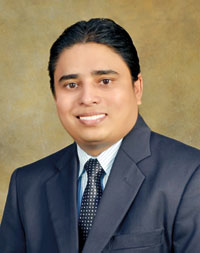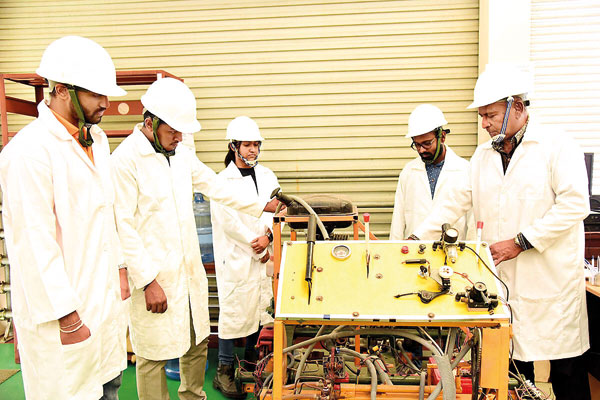SLIIT secures IESL Conditional Recognition for Mechanical Engineering Degree raising the bar for Sri Lankan education
View(s):- Interview with Prof. Migara Liyanage, Head, Department of Mechanical Engineering, SLIIT
SLIIT has achieved a significant milestone for its Mechanical Engineering programme by obtaining conditional recognition from the Institution of Engineers, Sri Lanka (IESL). The recognition is a crucial first step towards gaining full accreditation, which is essential for international recognition and employability of the programme’s graduates.
Prof. Migara Liyanage, Head, Department of Mechanical Engineering, SLIIT, explains the significance of the achievement, the key factors that contributed to meeting IESL’s standards, and the unique features of SLIIT’s Mechanical Engineering program that sets it apart from other institutions.
Q: Can you first elaborate on the pathway in which SLIIT’s Mechanical Engineering degree programme achieved conditional IESL recognition?
A: In 2013, SLIIT initiated engineering degree programs, including the establishment of the Department of Mechanical Engineering. The programmes we offered have received approval from the University Grants Commission (UGC). The inaugural batch of engineering students graduated in 2017. Marking a significant milestone, our Mechanical Engineering programme obtained conditional recognition, from the Institute of Engineers Sri Lanka for the graduating batches in 2025 and 2026.
Q: What is the significance for SLIIT and students enrolled in the programme?
A: Conditional recognition is a crucial milestone for us. It serves as the first step towards receiving full accreditation by IESL in accordance with the Washington Accord. The Washington Accord is a multi-lateral agreement between the international agencies or bodies that are responsible for providing accreditation and recognition to undergraduate-level engineering degrees. Achieving recognition not only validates the quality of our Mechanical engineering degree but also paves the way towards full accreditation.
Q: How will the recognition benefit students?
A: The immediate benefit of obtaining recognition is that, according to current regulations, all graduating mechanical engineers must become associate members of the IESL. With our programme’s recognition, graduates from these two batches are automatically conferred associate membership status. It holds great significance for our students, as it streamlines their path towards professional practice.
Q: What do you believe were the key factors contributing to SLIIT achieving recognition?
A: Our success in receiving conditional recognition can be attributed to several factors. SLIIT is committed to maintaining the quality of its degree programmes. We offer a highly contemporary curriculum designed to meet global standards and requirements. These have also been benchmarked with other local and international degree programmes. We ensure that students receive the best learning experience. We continue to improve our programmes so that they are on par with the latest developments and trends.
Q: What are the unique features of the program that distinguish SLIIT from other institutes and universities?
There are several unique features that distinguish the programmes at SLIIT from programs offered elsewhere. We offer the latest curricula which meets the necessary standards. It is comparable to any programme offered in other parts of the world. Another unique feature is the staff. Our faculty comprise exceptionally experienced and knowledgeable staff members, who are among the best in Sri Lanka. They bring both local and international experience. We have invested in state-of-the-art laboratory facilities to provide students with the necessary resources for practical learning and development of skills. I believe our talented staff, innovative curriculum, and state-of-the-art laboratory facilities set us apart. We work hard to maintain this uniqueness.

Q: How does the recognition benefit SLIIT graduates professionally?
With the establishment of the new Engineering Council Sri Lanka, it will be a mandatory requirement for practicing engineers to register in the council. All practicing engineers are also required to obtain the membership of the IESL. Having IESL recognition will provide our Mechanical Engineering graduates with a chance to automatically obtain the Associate Membership of the IESL. It will eventually help them become chartered engineers as they progress in their careers.
Q: How does it enhance their prospects for employability?
Once you complete the mechanical engineering degree programme at SLIIT it opens a wide spectrum of opportunities. It sets the foundation to embark on an engineering career. Those who graduate as mechanical engineers can select a career path in industry, academia or even as an entrepreneur. If you join the industry one can work as an engineer. Those who would like to join academia can embark on the career as a lecturer or as a researcher. As you progress in your career you may need to gain additional qualifications with higher studies. This degree will also provide students the basic qualification for higher studies. One could enrol in a master’s programme with the degree.
Q: In terms of the curriculum, what does the SLIIT Mechanical Engineering offer?
The Mechanical Engineering degree programme has been approved by the University Grants Commission. We have also aligned our curriculum with the requirements set by the IESL. SLIIT currently offers a general mechanical engineering degree as well as mechatronic engineering specialisation. The first year of our programme is common. During the first-year students begin to learn about the foundations in engineering. In the second year they learn general mechanical engineering. In the third year they continue to learn about engineering along with subjects such as management and law. During the fourth and final year, students engage in projects to solve real life problems. They will apply knowledge gained to solve practical problems. Students also have the chance to select electives based on their preference in an area they would like to further specialise. Students undergo a mandatory industrial training after the second and third years. This industrial training enables them to gain a first-hand experience in real-world engineering environments.
Q: What are the compelling reasons for prospective students considering pursuing mechanical engineering to enrol at SLIIT?
Mechanical Engineering is one of the most demanding fields today. There are job prospects in Sri Lanka as well as overseas. In the past we have maintained excellent employment rates. The government is planning to increase the production of the country and expand its export market. Mechanical Engineers can play a pivotal role. In years to come the country will require more mechanical engineers as it aims to expand the economy.
Our curriculum is meticulously designed to meet local and international standards, ensuring that graduates are well-prepared for the demands of the field. SLIIT faculty boasts extensive experience and expertise, providing students with invaluable guidance and mentorship throughout their academic journey. The state-of-the-art lab facilities further enhance the learning experience. Students engage in multiple projects during the course, providing them the hands-on experience and the practical application of theoretical concepts on real life problems.
Q: Can you comment on SLIIT research culture?
In recent times SLIIT is currently working hard to establish a vibrant research culture. Involving in research will provide students an opportunity to seek innovative solutions to real life problems in society. We believe in quality research that would lead to peer review publications in high quality journals. Last month we had two PhD graduates completing their degrees. In the past the department had a research collaboration with the Bentley Motors, UK. In recent times we work closely with several companies and other organizations for final year student projects. In the future, we plan to expand these collaborations with post graduate research leading to MPhil and PhD degrees.
Q: Looking ahead, what are the next steps following the recognition?
Our next objective is to secure full recognition of the degree programme. We are working hard to continuously improve our programs. We are also working on introducing emerging areas. For example, there are several emerging applications of artificial intelligence in mechanical engineering. We are also currently working on introducing a Master’s Programme in Industry 4.0 for working professionals and recent graduates. We are also looking forward to expanding on research. Post graduate programs will support the department towards our goal. We also look forward towards improving our interaction with the industry and other organisations. Involvement in industry sponsored consultancies and research projects will mutually benefit both parties.
HitAd.lk is the best and biggest mobile phone market in Sri Lanka, and we guarantee you will find what you need here from our extensive listing of mobile phones for sale in Sri Lanka. Whether it’s a budget-priced smartphone for communication, or higher end features with advanced connectivity, there are many different options from which to choose from on our site!


